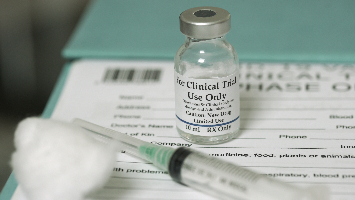Share this
new terms for remote research, virtual trials and monitoring
by Neoteryx Microsampling on Apr 19, 2021 9:00:00 AM
 The COVID-19 pandemic and its shelter-in-place requirements greatly accelerated the adoption of digital healthcare technologies and remote research or healthcare options. Conventional research studies, including clinical trials, required participants to congregate at a central location for enrollment, monitoring, testing, and other necessary activities. With new advances in remote technologies and portable devices, it has never been easier to conduct remote clinical trials that do not require participants to be physically present at a facility or trial site.
The COVID-19 pandemic and its shelter-in-place requirements greatly accelerated the adoption of digital healthcare technologies and remote research or healthcare options. Conventional research studies, including clinical trials, required participants to congregate at a central location for enrollment, monitoring, testing, and other necessary activities. With new advances in remote technologies and portable devices, it has never been easier to conduct remote clinical trials that do not require participants to be physically present at a facility or trial site.
Trial organizers have much to gain from pivoting to remote research; this model also provides cost savings and increases safety and satisfaction for both patients and staff. However, the rapid increase in the number of research organizations taking advantage of remote and digital technologies has led to some confusion regarding the meanings of many terms used to describe research studies that occur outside of a brick-and-mortar facility.
5 New Terms for Remote Research and Virtual Trials
Here are five terms that may help to broaden your understanding of this burgeoning shift in the research and healthcare industries.
1. Decentralized Clinical Trials
While a conventional clinical trial is based at a central location where enrollment, specimen sample collection and testing takes place, decentralized clinical trials allow participants to take part in a clinical study remotely. With a decentralized trial, there isn't always a central brick-and-mortar location involved. Study volunteers who opt to participate from home can enroll in a trial, access trial information, self-collect specimen samples, submit health data, and speak to staff members without ever visiting a designated trial site.
For decentralized trials, self-collected specimens using portable tools like Mitra® devices can be mailed to a central lab for analysis, while health data and other information can be submitted online. Communications with staff may occur via email, phone, video chat or through an online forum. Training and orientation for trial procedures might also be conducted via video calls and email, with additional materials accessible online via videos, slideshows and illustrated instructions.
2. Hybrid Clinical Trials
Hybrid clinical trials combine elements of centralized and decentralized clinical trials to create a unique type of study that can take place both on- and off-site. This model gives researchers the ability to offer the added flexibility of remote studies to participants while preserving the traditions and strengths of the conventional clinical trial process. For example, it can be helpful to provide orientation and training onsite and in-person, before switching to entirely digital and remote channels and processes.
3. Virtual Clinical Trials
Virtual clinical trials are decentralized trials that rely on virtual solutions. This term is common, but it is also slowly being phased out.
While the term "virtual" is not entirely inaccurate, its implications are somewhat misleading. To say that a clinical trial is "virtual" implies it involves computer simulation with no human participants involved. This is not the case.
Virtual clinical trials still depend on human participants for their results. Remote participants may use portable Mitra devices in remote sample collection kits, and "virtual" communications to contribute to the study from a distance, rather than by visiting a trial site. Some alternative terms that more accurately describe this model include “remote trials” and “decentralized clinical trials.”
4. Remote Monitoring and Remote Clinical Trials
Remote monitoring (sometimes called “remote patient monitoring” or “RPM”) refers to the research team's ability to remotely observe and track trial participants’ progress through the duration of a clinical trial. This can be done remotely using a combination of online surveys and questionnaires, phone or video call interviews, and remote specimen collection processes.
Remote specimen collection, or remote microsampling, is the most logistically challenging of the three monitoring components, but it can be made much easier with the right tools for support.
Using Mitra® devices based on VAMS® technology, participants can self-collect a precisely-sized microsample of biological fluid like blood, urine, or even perspiration. These samples are intended to be transported and analyzed as dried specimens, making it possible to safely mail them to the trial laboratory by regular post. No cold-shipping methods are required. Participants mail in their samples using the provided packaging, which makes this option exceptionally convenient for trial volunteers.
5. Remote Source Document Verification
Remote source document verification allows trial participants to submit their paperwork and other documentation online using secure digital processes paired with data warehouses and eClinical solutions. Email and fax are also occasionally used as supplementary methods of communication when legally possible. When combined with technologies like volumetric microsampling with Mitra® devices for at-home specimen collection, remote source document verification makes it possible for trials to operate with very limited physical contact between participants and staff.
Clinical trials are evolving, and so too are the words or terms we use to describe them. Understanding when to use each term to describe a trial design is key to helping potential trial volunteers and others understand what type of study you are conducting. By clearly communicating that you are conducting a decentralized study that offers more convenience and flexibility to study volunteers, you can improve recruitment, adherence, and overall volunteer experience in clinical trials.
Share this
- Microsampling (206)
- Research, Remote Research (119)
- Venipuncture Alternative (105)
- Clinical Trials, Clinical Research (83)
- Mitra® Device (73)
- Therapeutic Drug Monitoring, TDM (51)
- Dried Blood Spot, DBS (39)
- Biomonitoring, Health, Wellness (30)
- Infectious Disease, Vaccines, COVID-19 (24)
- Blood Microsampling, Serology (23)
- Omics, Multi-Omics (21)
- Decentralized Clinical Trial (DCT) (20)
- Specimen Collection (18)
- Toxicology, Doping, Drug/Alcohol Monitoring, PEth (17)
- Skin Microsampling, Microbiopsy (14)
- hemaPEN® Device (13)
- Preclinical Research, Animal Studies (12)
- Pharmaceuticals, Drug Development (9)
- Harpera Device (7)
- Industry News, Microsampling News (5)
- Antibodies, MAbs (3)
- Company Press Release, Product Press Release (3)
- Environmental Toxins, Exposures (1)
- July 2025 (1)
- May 2025 (1)
- April 2025 (2)
- December 2024 (2)
- November 2024 (1)
- October 2024 (3)
- September 2024 (1)
- June 2024 (1)
- May 2024 (1)
- April 2024 (4)
- March 2024 (1)
- February 2024 (2)
- January 2024 (4)
- December 2023 (3)
- November 2023 (3)
- October 2023 (3)
- September 2023 (3)
- July 2023 (3)
- June 2023 (2)
- April 2023 (2)
- March 2023 (2)
- February 2023 (2)
- January 2023 (3)
- December 2022 (2)
- November 2022 (3)
- October 2022 (4)
- September 2022 (3)
- August 2022 (5)
- July 2022 (2)
- June 2022 (2)
- May 2022 (4)
- April 2022 (3)
- March 2022 (3)
- February 2022 (4)
- January 2022 (5)
- December 2021 (3)
- November 2021 (5)
- October 2021 (3)
- September 2021 (3)
- August 2021 (4)
- July 2021 (4)
- June 2021 (4)
- May 2021 (4)
- April 2021 (3)
- March 2021 (5)
- February 2021 (4)
- January 2021 (4)
- December 2020 (3)
- November 2020 (5)
- October 2020 (4)
- September 2020 (3)
- August 2020 (3)
- July 2020 (6)
- June 2020 (4)
- May 2020 (4)
- April 2020 (3)
- March 2020 (6)
- February 2020 (3)
- January 2020 (4)
- December 2019 (5)
- November 2019 (4)
- October 2019 (2)
- September 2019 (4)
- August 2019 (4)
- July 2019 (3)
- June 2019 (7)
- May 2019 (6)
- April 2019 (5)
- March 2019 (6)
- February 2019 (5)
- January 2019 (8)
- December 2018 (3)
- November 2018 (4)
- October 2018 (7)
- September 2018 (6)
- August 2018 (5)
- July 2018 (8)
- June 2018 (6)
- May 2018 (5)
- April 2018 (6)
- March 2018 (4)
- February 2018 (6)
- January 2018 (4)
- December 2017 (2)
- November 2017 (3)
- October 2017 (2)
- September 2017 (4)
- August 2017 (2)
- July 2017 (4)
- June 2017 (5)
- May 2017 (6)
- April 2017 (6)
- March 2017 (5)
- February 2017 (4)
- January 2017 (1)
- July 2016 (3)
- May 2016 (1)
- April 2016 (2)



No Comments Yet
Let us know what you think